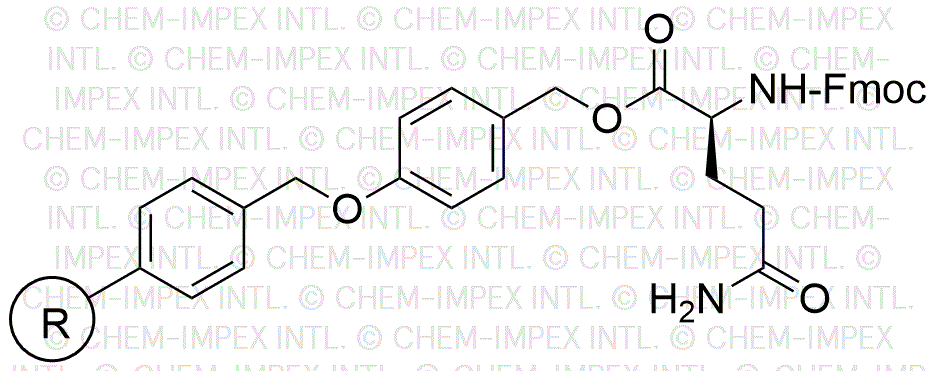Na-Fmoc-D-glutamine 4-alkoxybenzyl alcohol resin is widely utilized in research focused on
- Peptide Synthesis: This resin is essential for solid-phase peptide synthesis, allowing researchers to create custom peptides efficiently. Its stability and ease of use streamline the synthesis process.
- Drug Development: In pharmaceutical research, it aids in the development of peptide-based drugs, which are increasingly important for targeting specific biological pathways.
- Bioconjugation: The resin can be used to attach peptides to other molecules, facilitating the creation of bioconjugates for targeted drug delivery systems.
- Protein Engineering: It supports the design and modification of proteins, enhancing their functionality for various applications in biotechnology and medicine.
- Research in Neuroscience: The compound is valuable in studying neuropeptides, contributing to advancements in understanding neurological functions and disorders.
General Information
Properties
Safety and Regulations
Applications
Na-Fmoc-D-glutamine 4-alkoxybenzyl alcohol resin is widely utilized in research focused on
- Peptide Synthesis: This resin is essential for solid-phase peptide synthesis, allowing researchers to create custom peptides efficiently. Its stability and ease of use streamline the synthesis process.
- Drug Development: In pharmaceutical research, it aids in the development of peptide-based drugs, which are increasingly important for targeting specific biological pathways.
- Bioconjugation: The resin can be used to attach peptides to other molecules, facilitating the creation of bioconjugates for targeted drug delivery systems.
- Protein Engineering: It supports the design and modification of proteins, enhancing their functionality for various applications in biotechnology and medicine.
- Research in Neuroscience: The compound is valuable in studying neuropeptides, contributing to advancements in understanding neurological functions and disorders.
Documents
Safety Data Sheets (SDS)
The SDS provides comprehensive safety information on handling, storage, and disposal of the product.
Product Specification (PS)
The PS provides a comprehensive breakdown of the product’s properties, including chemical composition, physical state, purity, and storage requirements. It also details acceptable quality ranges and the product's intended applications.
Certificates of Analysis (COA)
Search for Certificates of Analysis (COA) by entering the products Lot Number. Lot and Batch Numbers can be found on a product’s label following the words ‘Lot’ or ‘Batch’.
*Catalog Number
*Lot Number
Certificates Of Origin (COO)
This COO confirms the country where the product was manufactured, and also details the materials and components used in it and whether it is derived from natural, synthetic, or other specific sources. This certificate may be required for customs, trade, and regulatory compliance.
*Catalog Number
*Lot Number
Safety Data Sheets (SDS)
The SDS provides comprehensive safety information on handling, storage, and disposal of the product.
DownloadProduct Specification (PS)
The PS provides a comprehensive breakdown of the product’s properties, including chemical composition, physical state, purity, and storage requirements. It also details acceptable quality ranges and the product's intended applications.
DownloadCertificates of Analysis (COA)
Search for Certificates of Analysis (COA) by entering the products Lot Number. Lot and Batch Numbers can be found on a product’s label following the words ‘Lot’ or ‘Batch’.
*Catalog Number
*Lot Number
Certificates Of Origin (COO)
This COO confirms the country where the product was manufactured, and also details the materials and components used in it and whether it is derived from natural, synthetic, or other specific sources. This certificate may be required for customs, trade, and regulatory compliance.

